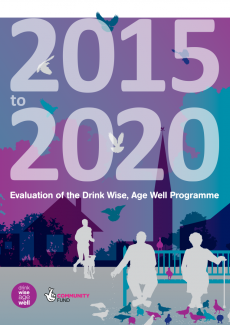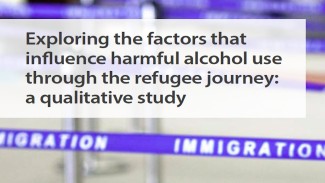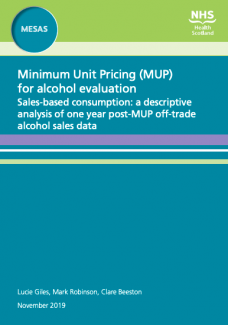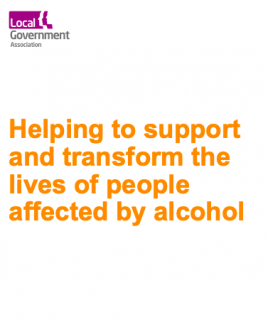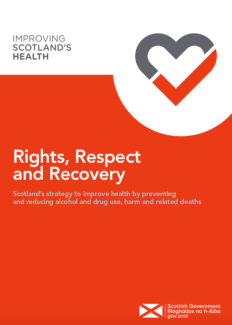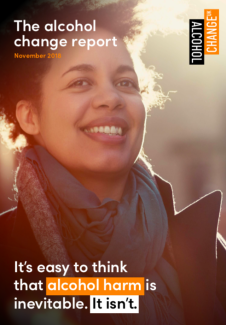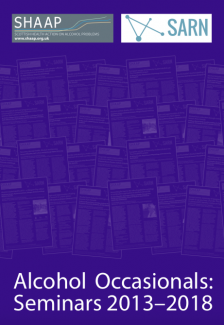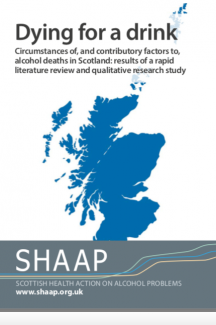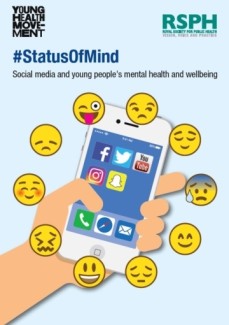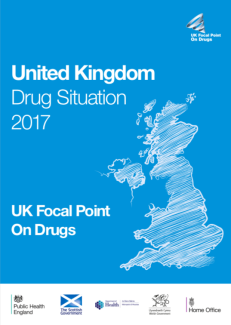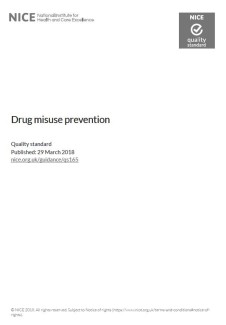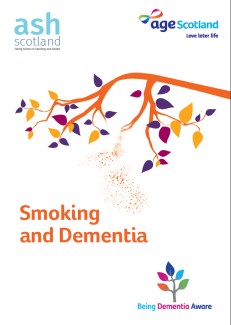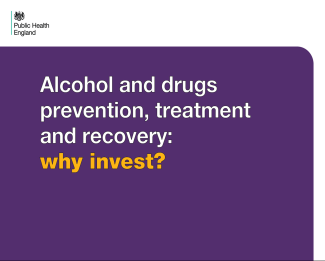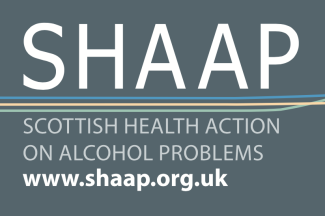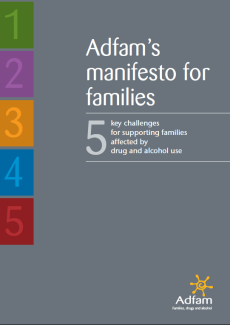Search
Evaluation of the Drink Wise Age Well Programme
The Drink Wise, Age Well programme was delivered over five years from 2015 to 2020 in five intervention areas across the UK.
The project had 4 objectives:
- To raise awareness of the issue of alcohol misuse among people over 50, change...
Nudge Theory and Alcohol Policy: How Nudge Might Shape Drinking
Summary
- Nudge theory aims to understand human decision making in order to optimise the outcomes from choices for decision makers. The theory has become increasingly popular amongst public health policymakers in recent years
- The use of...
Exploring the Factors that Influence Harmful Alcohol Use Through the Refugee Journey: A Qualitative Study
This report from Scottish Health Action on Alcohol Problems (SHAAP) and the University of Edinburgh School of Health in Social Science explores the factors influencing harmful alcohol use through the refugee journey.
Drawing on interviews...
Evaluating the Impact of Minimum Unit Pricing (MUP) on Sales-Based Consumption in Scotland
The rise in alcohol consumption and alcohol-related harms in the UK in recent decades has gone hand in hand with the increasing affordability of alcoholic beverages.
Minimum Unit Pricing (setting a minimum price below which a unit of...
Helping to Support and Transform the Lives of People Affected by Alcohol
Drinking to excess takes a huge toll on individuals, families, communities and society as a whole.
Many adult problem drug users have long histories of substance misuse which often starts before the age of 18.
Providing well-funded...
Rights, Respect and Recovery: Action Plan
In 2018, the Scottish Government released the Rights, Respect and Recovery: Scotland's Alcohol and Drug Treatment Strategy.
Scotland's first drugs strategy for a decade focuses on treating the issue as a public health concern rather than a...
Smoking, Drinking and Drug Use among Young People in England
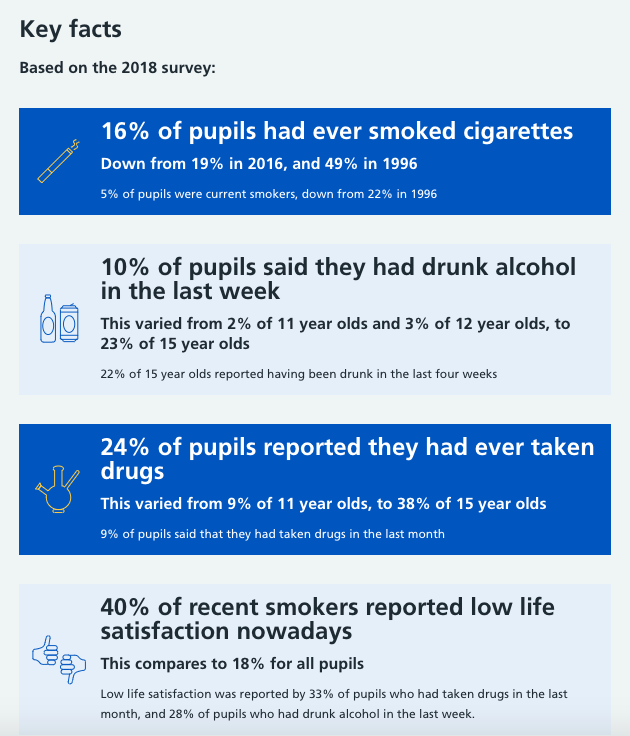 The National Health Service has been closely following the smoking, drinking and drug use trends amongst young people in England.
The National Health Service has been closely following the smoking, drinking and drug use trends amongst young people in England.
The series of surveys began in 1982. The most recent 2018 survey questioned 13,664 year 7 to 11 pupils...
Alcohol Interventions in Secondary and Further Education
Alcohol use during the teenage years is related to a wide range of health and social problems. The National Institute for Health and Care Excellence has developed new guidelines to help schools and colleges when teaching their pupils about...
Rights, Respect and Recovery: Scotland's Alcohol and Drug Treatment Strategy
The Scottish Government has released the new Alcohol and Drugs Strategy, which aims to improve health by preventing and reducing alcohol and drug use, harm and related deaths. There were a record 934 drugs-related deaths in Scotland in 2017...
The Alcohol Change Report
Alcohol Change UK have released their latest report, which highlights the state of alcohol use in the UK and recommends changes that will reduce harm and promote a healthier society.
The report gives a clear overview of the cost and...
Alcohol Occasionals: Seminars 2013–2018
Almost a fifth more alcohol is sold per adult in Scotland than in England and Wales. It is believed 1 in 4 people drink at hazardous or harmful levels and in 2016 alone there were over 1,200 alcohol-related deaths in Scotland.
Scottish...
Dying for a Drink
Scottish Health Action on Alcohol Problems (SHAAP) has published its latest report, ‘Dying for a drink’.
Scottish people tend to consume more alcohol than people in England and Wales. Alcohol is a harmful substance and, consumed in excess...
#StatusofMind: Social Media and Young People's Mental Health and Wellbeing
KEY POINTS
- 91% of 16-24 year olds use the internet for social networking
- Social media has been described as more addictive than cigarettes and alcohol
- Rates of anxiety and depression in young people have risen 70% in the past 25 years ...
United Kingdom Drug Situation: Focal Point Annual Report
The United Kingdom Focal Point on Drugs (UK Focal Point) 2017 report is available on the UK government's digital portal.
Based at Public Health England, the UK Focal Point is the national partner of the European Monitoring Centre for Drugs...
Drug Misuse Prevention Quality Standards
This quality standard covers the prevention or delay of harmful use of drugs by children, young people and adults most likely to start using drugs, or already experimenting or using drugs occasionally. This includes illegal psychoactive...
Smoking and Dementia
Introduction
Dementia is a set of symptoms associated with an ongoing decline of the brain and its abilities. This can include problems with memory loss, thinking, mental agility, language and understanding. Dementia is common – around 90...
Alcohol and Drugs Prevention, Treatment and Recovery: Why Invest?
Estimates show that in the UK the social and economic costs of alcohol related harm amount to £21.5bn, while harm from illicit drug use costs £10.7bn. These include costs associated with deaths, the NHS, crime and, in the case of alcohol...
Alcohol Interventions in Primary Care Settings: What Works, What Doesn’t and What's Next?
This week saw the seminar launch at Edinburgh’s Royal College of Physicians of two key reports on alcohol interventions in primary care settings published by the Scottish Health Action on Alcohol Problems (SHAAP) in collaboration with the U...
Adfam’s Manifesto for Families: 5 Key Challenges for Supporting Families Affected by Drug and Alcohol Use
“You don’t have to use drugs to be affected by them.”
In 2010 Adfam identified five key challenges for families that the Government should address, identified by stakeholders across England. They were:
- Supporting families in their own...
Share the Knowledge: ISSUP members can post in the Knowledge Share – Sign in or become a member

